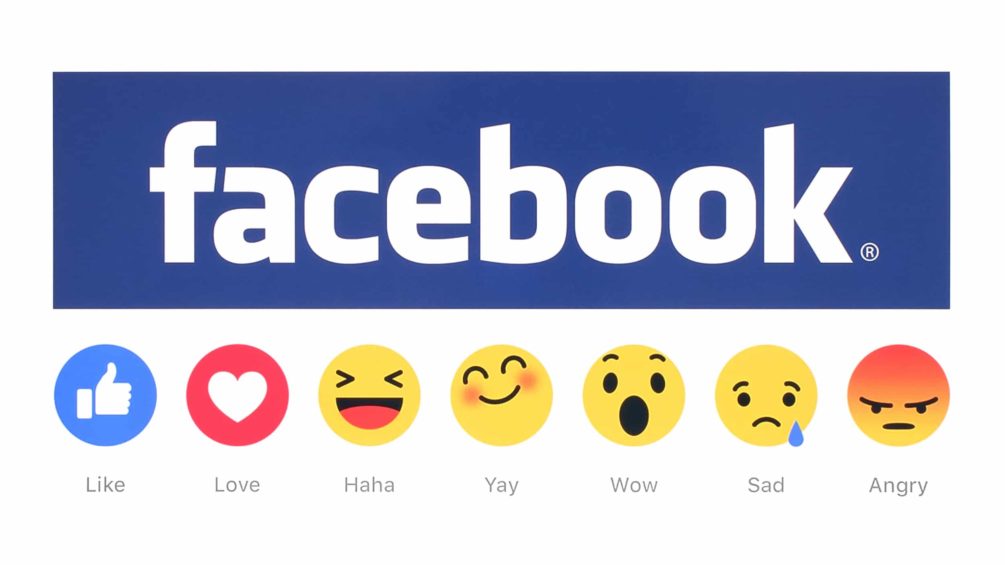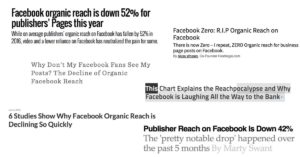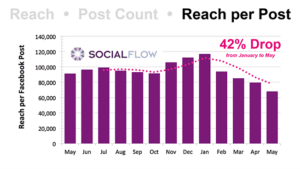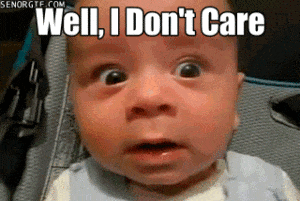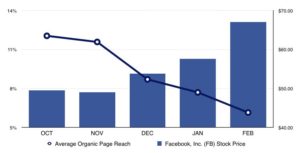Facebook's Organic Reach Is Worse Than We Thought
Facebook’s organic reach is becoming obsolete at an alarming pace. Over the last few years, and even the last few months, we’ve noticed a striking loss in Facebook’s organic reach for our own clients.
But we’re not the only ones noticing such an alarming trend: Millions of other business and page owners are facing a similar crisis.
So what’s the deal? The “Reachpocalypse” is upon us.
Facebook's Organic Reach By The Numbers
You may be wondering what organic reach is and why it matters to you. According to Facebook, “organic reach” is the number of people you can reach for free on Facebook by simply posting to your page. So ideally the content would be shown to all of your followers.
Social@Ogilvy first reported on Facebook’s restricted organic reach in 2014. The study, Facebook Zero: Considering Life After the Demise of Organic Reach, is widely cited among industry professionals.
When Facebook launched “Fan Pages” in 2007, it was assumed that all of a page’s “fans” would see messages and posts the page was sending out. But in 2012 Facebook restricted organic reach to just 16 percent. Organic reach has been dropping precipitously ever since.
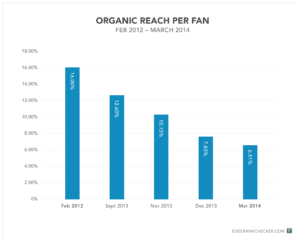
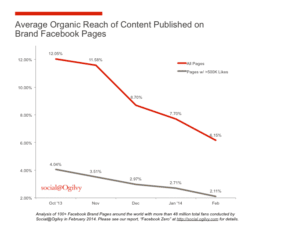
Credit: Social@Ogilvy
Earlier this year, the popular social publishing tool SocialFlow reported a 52 percent decline in organic reach from January to May. Its analysis was based on a review of 3,000 Facebook pages.
Research from Social@Oglivy also suggests that large Facebook pages with more than 500,000 Likes should expect to reach only two percent of followers.
What Facebook Says About Organic Reach
As word started to spread about Facebook’s organic reach dwindling, Facebook sent out a response of its own, listing two main reasons for the decline:
- More and more content is created and shared every day, which created competition for its users’ attention. Facebook estimates that, on average, 1,500 stories could appear on a person’s News Feed each time they log on. The more friends and Page likes you have, the more stories could appear.
- Rather than showing every single person and company’s content, Facebook shows its users the content that is the most relevant to them. Facebook’s News Feed ranks every story individually from least to most important by looking at thousands of factors relevant to each person.
How Facebook Determines What Posts To Show You
Since Facebook launched in 2006, its News Feed algorithm has become much more sophisticated and complex.
Facebook's first News Feed algorithm operated under a point-based system where different formats would receive different point values. For example, a post with just text might receive one point, but a post with text and a link would be worth two points. Then, the algorithm would multiply the post format point value by the number of people interacting with it and—voila!—Facebook’s first ranking system was born.
Throughout the years, Facebook continued to work on its News Feed algorithm and later introduced EdgeRank, an algorithm based on the chronological order of posts and the relationship between the person who published the post and the person interacting with the post. EdgeRank’s algorithm lasted until 2011, when it was shut down for good.
Facebook’s current algorithm—which sadly has no catchy, easy-to-use name—is an artificial intelligence learning-based algorithm. HubSpot sums it up nicely: “Facebook’s end goal here is to have its algorithm match News Feed content to the individual needs and interests of each and every user.”
Additionally, posts by friends and family tend to rank higher than posts by business pages because the former typically gets more interaction.
“Is this why I always see so many posts about babies?” Yes! You may not like seeing babies flood your news feed (as is a common complaint by many), but aggregately, people across Facebook love babies, so posts about them tend to rank higher. The same idea goes for engagements, marriages and other significant life events.
Facebook Introduces Pay To Play
Today’s Facebook business landscape is essentially pay-to-play. The more money you spend with Facebook, the more visibility your page and content will have.
Facebook states they are not trying to make more money, but that pages would do just as well if people were more active and engaged with content from businesses. However, some have speculated organic reach will eventually reach zero, making it almost mandatory to supplement your organic efforts with paid advertising.
Should You Stop Using Facebook?
Experts agree that it’s time to start thinking of Facebook as more of a paid ad platform and less of a free media channel. Even Facebook is encouraging businesses to look at fan bases as a way to bolster paid advertising efforts.
But should you stop using Facebook altogether? After all, there are still “free” media platforms available. Our advice is no. Even if you’re not reaching your audience, potential patients still visit your page as a preliminary check for your practice or hospital.
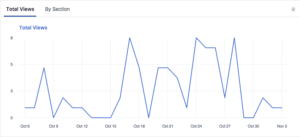
This is a screenshot of insights for one of our clients.
For the month of October, their average reach was 4.4% per post. During the same time period, 71 people visited the page, presumably to get a feel for the practice before deciding to make an appointment. This is a common trend I see with many of the Facebook Pages we manage.
It’s also worth noting that this will not be the last time Facebook changes the way things are done, and that’s okay. Facebook has made changes in the past that we’ve all adapted to, but as long as you stay up-to-date on new information, you’ll be prepared for these changes, too.
What's Currently Working For Businesses on Facebook
In its official statement about organic reach declining, Facebook was happy to point out several businesses still reaching their fans and beyond. Are these unicorns the exception to the organic reach rule? Sadly, no. Facebook also points out that these model businesses also utilized paid advertising to support their efforts.
However, there are things you can do to boost your page performance organically:
- Videos. We’ve talked about the power of videos on social media several times in previous blogs. Anybody who’s been paying attention will know that videos get attention and have a higher chance of engagement and reach.
- Personal Posts. Anytime we do a personal post for one of our clients (a birthday, office party or community event) they always do much better than a post featuring a blog or article. Posts like these make your practice more relatable and give patients a unique view into your practice or hospital.
- Be Selective. As Hubspot put it, it’s no longer about “spray and pray,” but more about getting as much interaction as possible per post. You can do this by being selective about what you post. Businesses should also utilize Facebook’s detailed targeting, which allows businesses to target a specific audience, even if it’s not sponsored.
The idea of transitioning away from organic Facebook posts to paid content may be hard to digest, especially since we’ve all been using Facebook as a free platform for years. The numbers don’t lie and we would be doing our clients a disservice if we didn’t recognize that.
It’s also important to keep in mind that Facebook, and social media in general, is just one part of an overall integrated marketing strategy. Social media is simply another avenue through which to convey a cohesive message about your brand.
Maintaining your online presence, which includes social media, is just as important as ever. Your patients are online, so why not meet them there?
Related Articles:
Everyone Exhale: Facebook Reach is Officially NOT Dead
Facebook Fundamentals: A Guide to Social Media in Healthcare Marketing
Has Facebook Become a Marketing Waste of Your Time?

